‘Everybody’s got a story’: Family histories take shape with Erving genealogy program
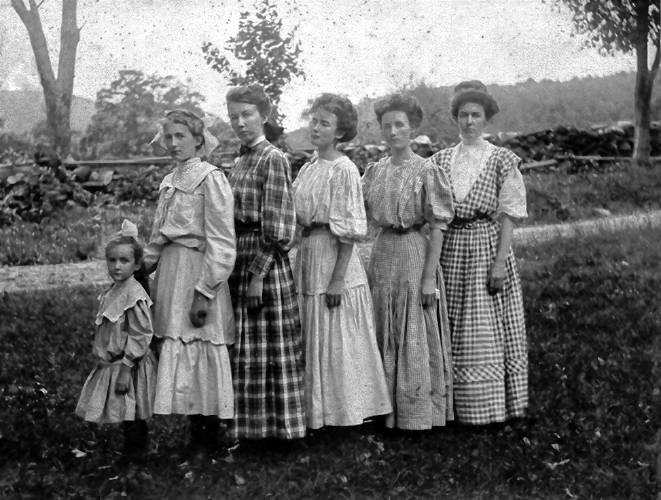
Philip Johnson’s grandmother and her five sisters, the Moore girls from Leverett, pictured in 1909. From left: Ida, Hazel, Flora, Rhoda, Mildred and Almyra. CONTRIBUTED PHOTO
|
Published: 02-13-2024 2:33 PM
Modified: 02-13-2024 6:02 PM |
ERVING — A pair of Erving residents are helping curious minds dive into their family histories through a regular program at the Erving Public Library.
Philip Johnson runs the program with Sara Campbell, offering drop-in genealogy assistance at the library on the second Sunday of each month from 1 to 3 p.m.
“People come with their questions [and] we help them get started,” Johnson said.
After teaching genealogy classes at nearby colleges and libraries, the genealogists started the program in 2010 at the Carnegie Public Library in Turners Falls before pandemic-related closures. The program started at the Erving library in September.
Johnson said Erving visitors typically take the first step into their past with the question, “Who do you know?” After listing relatives, Johnson or Campbell help visitors navigate ancestry.com, a genealogy database to which the library subscribes.
“You start by finding these people and then you start to go deeper into these people and find the stories,” Campbell explained. Both she and Johnson aim to search beyond the family tree into the metaphorical weeds and leaves. “You want personalities. You want something, not just the date.” Instead of a chart of ancestors’ birth and death dates separated by a dash, Campbell said, “You want what happened during that dash.”
Johnson followed the dashes of his history back to 1084. Along the way, he discovered ancestors who sailed on the Mayflower and fought in the American Revolution.
While tracking the dashes of her family history, Campbell found that her mother lived on the same street in Albany, New York, as her daughter. With lifelong Franklin County resident Shari Strahan, Campbell also co-wrote “Did Grandma Have a Filling Station? Greenfield Women and Their Historic Businesses.”
Article continues after...
Yesterday's Most Read Articles
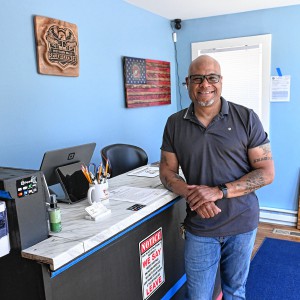 Retired police officer, veteran opens firearms training academy in Millers Falls
Retired police officer, veteran opens firearms training academy in Millers Falls
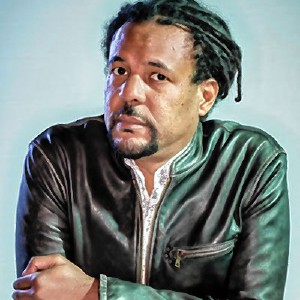 UMass graduation speaker Colson Whitehead pulls out over quashed campus protest
UMass graduation speaker Colson Whitehead pulls out over quashed campus protest
 As I See It: Between Israel and Palestine: Which side should we be on, and why?
As I See It: Between Israel and Palestine: Which side should we be on, and why?
 Real Estate Transactions: May 10, 2024
Real Estate Transactions: May 10, 2024
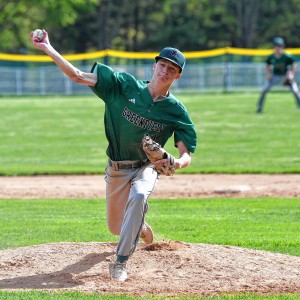 Baseball: Caleb Thomas pitches Greenfield to first win over Frontier since 2019 (PHOTOS)
Baseball: Caleb Thomas pitches Greenfield to first win over Frontier since 2019 (PHOTOS)
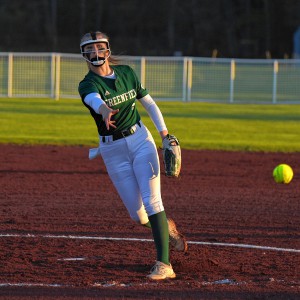 High Schools: Greenfield softball squeaks out 1-0 win over Franklin Tech in pitchers duel between Paulin, Gilbert
High Schools: Greenfield softball squeaks out 1-0 win over Franklin Tech in pitchers duel between Paulin, Gilbert
To Campbell and Johnson, genealogy is an endless “puzzle” they piece together with clues from newspaper articles and obituaries; census records; birth, marriage and death records; wills; school certificates; letters; and diaries. With each new clue, the quest becomes an addictive domino trail of discoveries.
“You can always take another branch. There’s always another uncle somewhere,” Johnson said.
Campbell and Johnson said the clues not only illuminate the everyday lives of their ancestors, but the historical events in the backdrop. Pointing to a picture of his grandmother and her five sisters in Leverett from 1909, Johnson said the photo illustrates how large families once were when children worked on family farms. Campbell also claimed that categories on census records, like house values and salaries, point to the state of the U.S. economy while languages reveal waves of immigration.
Library visitor John Wilson, an Athol resident, said genealogy brings these history lessons from high school and movies to life. The archaeologist created booklets detailing the life of his late mother, mosaics of the clues written in her diaries. From the movies she watched in theaters to the moves she and her friends danced on the weekends, Wilson filled in the blanks with research because he believes genealogy “connects people to their past … not just their assumptions.”
For Montague resident Ken Holmberg and Esther Johnson, Philip Johnson’s wife, the stories of their past feel close to their present.
“We are both first-generation Americans, so it’s right there, it’s right in our face. It’s not like people who came here in the 1700s. … We grew up with it,” said Esther Johnson, referring to her family history. Her mother immigrated to the United States from Sweden at 14 years old.
Holmberg visited the genealogy drop-in hours on Sunday to “find his ancestors who stayed behind” when his father also immigrated to the U.S. from Sweden. Using “Archive Digital,” a database of church records, Esther Johnson helped Holmberg take the first steps toward his aunt and her children, whom he hopes to meet in Sweden.
“I really appreciate having this place to go to,” he added.
The eager chatter of visitors trading clues and puzzles in the Erving library on Sunday encapsulates the countrywide genealogy craze. According to TIME, genealogy was the second most popular hobby in the U.S. in 2014 after gardening. Online databases like ancestry.com and 23andMe sped up the process and catapulted the quest into a billion-dollar industry, inspiring series like “Finding Your Roots,” “Genetic Detective,” “Relative Race” and “Genealogy Roadshow.”
No matter the inspiration for starting a genealogy quest, Campbell emphasized that everyone’s past holds this puzzle.
“It’s stories,” she said. “Everybody’s got a story.”

 Deerfield’s Tilton Library expansion ‘takes a village’
Deerfield’s Tilton Library expansion ‘takes a village’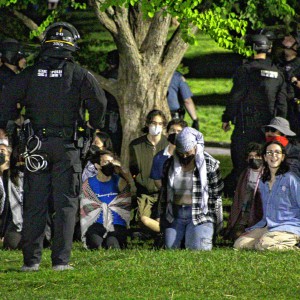 UMass student group declares no confidence in chancellor
UMass student group declares no confidence in chancellor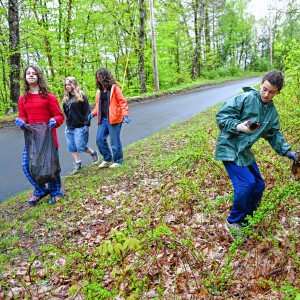 Four Rivers Climate Club organizes litter cleanup, panel on environmental activism
Four Rivers Climate Club organizes litter cleanup, panel on environmental activism
